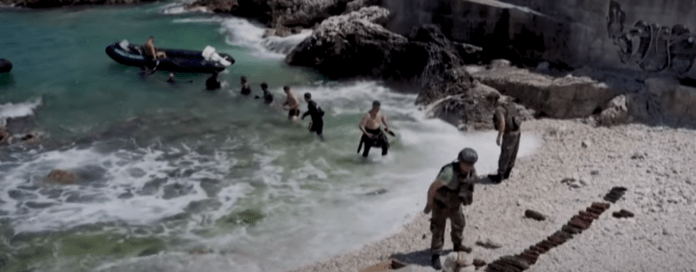“If you ever come across anything suspicious like this item, please do not pick it up, contact your local law enforcement agency for assistance”
Nën një shkëmb në gjirin e Vlorës, një nga vendet më të bukura të rivierës shqiptare, një zhytës del nga uji duke mbajtur një predhë artilerie të cilën e vendos me kujdes në plazhin me guralecë. Poshtë ujit të pastër kristal të Adriatikut atje, predha dhe granata që datojnë nga Lufta e Dytë Botërore ndryshken në shtratin e detit, thotë AFP, duke ndotur ambientin dhe duke paraqitur njëkohësisht një kërcënim vdekjeprurës. Në bordin e anijes mbështetëse të zhytjes “Pluton”, një grup prej rreth 10 zhytësish francezë dhe shqiptarë janë në një mision të përbashkët për të gjetur dhe hequr municionet, por askush nuk e di se sa kanë mbetur ende. Brenda më pak se dy orësh, ata arritën në mënyrë mbresëlënëse të mbledhin 85 copë municione, të cilat me gjasë janë hedhur qëllimisht në det nga trupat pushtuese italiane mbi shtatë dekada më parë. “Këto janë municione italiane të Luftës së dytë Botërore, të cilat në vend që t’i dërgonin mbrapsht në Itali, i braktisën këtu e i hodhën në det”, tha Ilirian Kristo , zv/komandat i njësisë së zhytësve. Specialistët gjetën gjithsej 310 pajisje të tilla gjatë operacioneve të përbashkëta franko-shqiptare vitin e kaluar. Shumica e tyre ishin predha artilerie, të vendosura midis shkëmbinjve në shtratin e detit. “Është një punë e përbashkët me marinën shqiptare, e cila e njeh vendin më mirë se ne. Identifikimin e saktë të mortajave e predhave që nxjerrim e komplikon fakti që gjendja e tyre është përkeqësuar mjaft. Kjo mund të ndodhë vetëm nëse kalojnë një kohë të caktuar në tokë, nën ujë është mjaft e vështirë”, tha Aymeric Barazer de Lannurien, kapiteni i “Pluton”. “Gjatë operacionit të sotëm gjetëm 85 predha të përmasave të ndryshme, nga 155 mm deri tek ato më të voglat. Ata do të transportohen në Tiranë për t’u asgjësuar në një terren shkatërrimi të municioneve të pashpërthyera”, tha Ilirian Kristo. Ekipet e angazhuara për këtë qëllim përballen jo vetëm me rrezikun e shpërthimit të municioneve, por edhe me detin e trazuar dhe vapën përvëluese. Megjithatë siç thotë Ilirian Kristo, zhytja për gjetjen dhe asgjësimin e bombave nuk është vetëm profesion, por edhe një pasion i madh./topchannel
Photo-Source: priza.al
Under a cliff in Vlora bay, one of the most beautiful sites on the Albanian Riviera, a diver emerges from the water carrying an artillery shell which he carefully places on the pebbly beach. Beneath the crystal-clear water of the Adriatic, shells and grenades dating back to World War II rust on the seabed, polluting the water and posing a deadly threat to life. Aboard the Pluton diving support vessel, a group of some 10 French and Albanian de-mining divers are on a joint mission to find and remove the munitions – but nobody knows how many still remain. In less than two hours, the divers collected an impressive 85 pieces of ammunition, which were likely deliberately thrown into the sea by occupying Italian troops over seven decades ago. “It’s joint work with the Albanian navy, which knows the site better than we do,” Captain Aymeric Barazer de Lannurien, commander of the French contingent, told AFP. Specialists recovered a total of 310 devices during 2021’s joint Franco-Albanian effort. Barazer de Lannurien said most of the shells found were artillery shells, lodged between rocks on the seabed. “We found one or two grenades that were on the bottom between the rocks, easily accessible to the population [that] could be dangerous for swimmers,” he recalled of 2021’s mission. This time around, the team said they recovered mortars and shells with calibres ranging from 20 to 155 millimeters. While there are no official estimates of the quantities of submerged munitions, experts estimate that at least 20 World War II wrecks are located near Albania’s Adriatic coast. The teams are well-versed in handling the potentially lethal cast-offs, but an ambulance is parked nearby just in case. Divers pass the explosive devices between them before carefully lining them up on the beach, reminders of past conflicts. Albanian troops then collect the shells and destroy them at a military base in the capital Tirana.
If you find anything that appears to be an explosive device, do not touch it, leave it where it is and call the police. We will contact the appropriate agencies to properly dispose of the item.
Dear editors, Biography of a bomb is aimed at highlighting the danger caused by unexploded bombs. Moreover, the most important aspect is that we work completely non profit, raising awerness about this topic is what drives us. We apologize if we make use of pictures in yours articles, but we need them to put a context in how findings are done. We will (and we always do) cite source and author of the picture. We thank you for your comprehension





